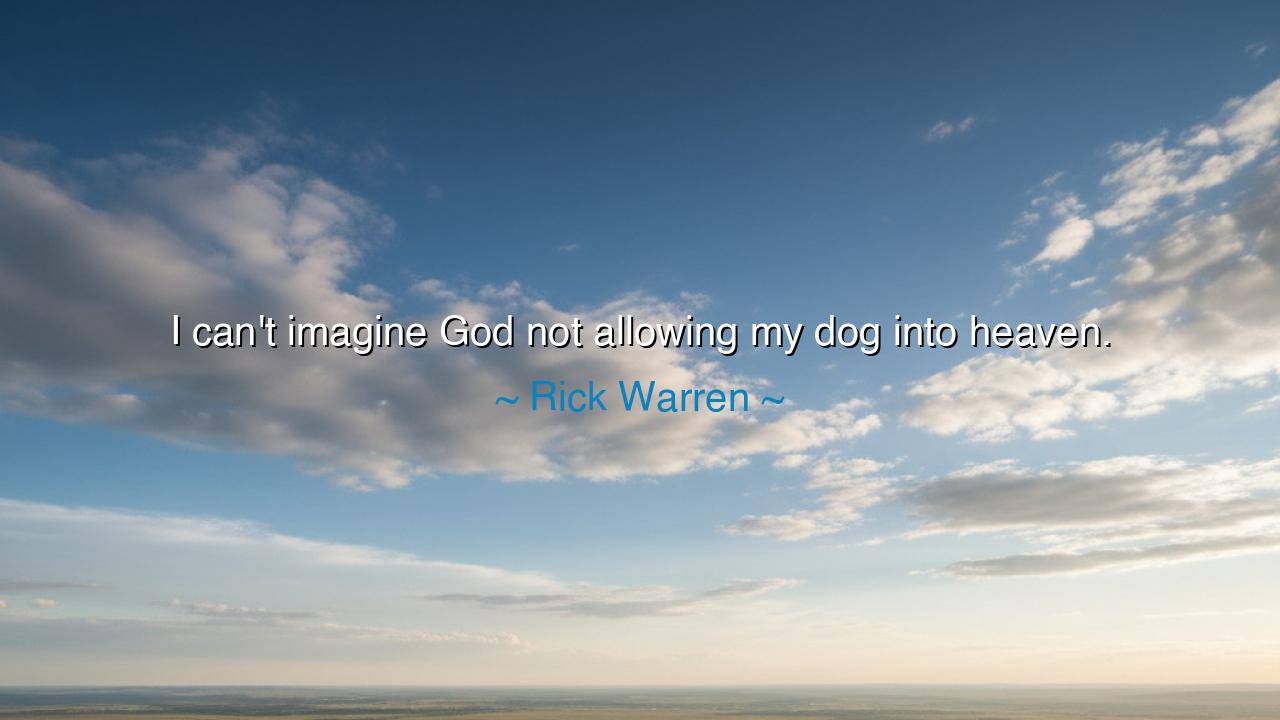
I can't imagine God not allowing my dog into heaven.






Hear the tender and defiant words of Rick Warren: “I can’t imagine God not allowing my dog into heaven.” At first, these words stir the heart with warmth, yet behind their simplicity stands a profound meditation on love, loyalty, and eternity. For Warren speaks not merely of his dog, but of the very nature of divine goodness. He proclaims that if heaven is the place of perfect joy, then surely it must hold within it the creatures who gave us joy on earth. His words are not a question of theology alone—they are a cry of the heart that refuses to separate love from eternity.
The ancients also pondered this mystery. In Egypt, beloved animals were buried with their masters, for it was believed they would accompany them into the afterlife. In Norse myth, the great hound Garmr stands at the gates of the underworld, proof that even beasts are bound to eternity’s order. And in Christian thought, though debate has long raged, there has always been the whisper that if creation groans for redemption, as the apostle Paul declared, then perhaps animals too shall share in the renewal of all things. Warren’s words are thus part of a long tradition: the belief that heaven without the faithful beasts of earth would be less than heaven.
Consider the true story of Greyfriars Bobby, the little terrier who kept vigil at his master’s grave in Scotland for fourteen years. He became a symbol of loyalty that outlived death. People came from across the land to honor him, to feed him, and to marvel at his devotion. Can one imagine a heaven that would separate such a creature from the master he loved? Warren’s words echo here: the dog’s loyalty is not wasted, nor is it forgotten by God, who is love itself.
Yet Warren’s saying is more than affection for pets—it is a statement about the nature of God. If God is just, merciful, and overflowing with compassion, then heaven must also reflect these qualities perfectly. To exclude the creatures who brought laughter to children, comfort to the lonely, and loyalty to the brokenhearted would be contrary to the fullness of divine love. In this way, the dog becomes more than an animal—it is a living parable of God’s faithfulness, a reminder that love is not erased by death but fulfilled in eternity.
At its heart, the quote is also a rebuke to human arrogance. Too often, man assumes that he alone matters in the grand design, forgetting that animals, too, bear the breath of life, given by the Creator. Warren’s words remind us that our bond with animals is not trivial, but sacred. They have walked beside us in labor, in grief, and in joy; they have offered what men too often withhold—unconditional loyalty. If heaven is to be whole, then their presence belongs there as surely as ours.
The lesson is clear: do not treat lightly the love of animals. Recognize in their loyalty a reflection of the divine, and let it shape the way you live. Care for them with gentleness, as stewards of God’s creation. See in their devotion a standard for your own relationships—faithful, steadfast, true. And when death takes them, do not despair as those who have no hope, but remember Warren’s words: heaven is too great, too merciful, too full of love to exclude them.
So let this saying be carried forward, not only as comfort for grieving hearts but as a vision of eternal love: “I can’t imagine God not allowing my dog into heaven.” Live, then, in such a way that you honor every creature entrusted to you. Cherish their companionship, learn from their loyalty, and hold fast to the hope that what is loved truly is never lost. For in the kingdom of God, love does not die—it is crowned with immortality, and all faithful hearts, human and beast alike, will be gathered into joy everlasting.






AAdministratorAdministrator
Welcome, honored guests. Please leave a comment, we will respond soon